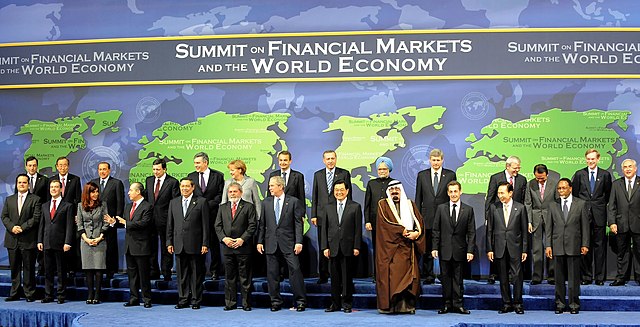ミドルパワー
一定程度の穏健な国際的影響力を持つ国家 ウィキペディアから
ミドルパワー(英語: Middle power)とは、超大国や大国ではないが、一定程度の穏健な国際的影響力を持つ国家を指す。日本語では「中堅国家」と表記されることが多い[1]。
この記事は英語版の対応するページを翻訳することにより充実させることができます。(2025年3月) 翻訳前に重要な指示を読むには右にある[表示]をクリックしてください。
|

概要
ミドルパワー国家の明確な定義は学者や研究者の間で意見が分かれており、一部大国との重複が見られる[2]。アメリカ合衆国、中華人民共和国、ロシア、イギリス、フランスは国際連合安全保障理事会における常任理事国であり、巨大な経済力や強大な軍事力、公式な核兵器の保有などから大国の地位にあると考えられている一方で、超大国とされるアメリカと中国を除きミドルパワーと扱う事例も存在する[3]。日本とドイツは経済力の大きさから一般的には大国と考えられる。イタリアについては評価が分かれており、強力な経済力やG7としての地位から大国の一員であると考える学者もいる[4]。同じくカナダも大国とする場合がある[5]。新興国(グローバルサウス)では、経済力のあるインドやブラジルも大国や列強の一員とする場合がある[6][7][8][9]。
一覧
- グレートパワー(大国)と一部重なる国家
 イギリス[3]
イギリス[3] フランス[3]
フランス[3] ロシア[10]
ロシア[10] 日本[11][12][13]
日本[11][12][13] ドイツ[14][15]
ドイツ[14][15] インド[16][17][18][11]
インド[16][17][18][11] カナダ[19][20][21][22][23]
カナダ[19][20][21][22][23] イタリア[24][25][26]
イタリア[24][25][26] ブラジル[27][28][29][30]
ブラジル[27][28][29][30]
- ミドルパワー
 アンゴラ[31]
アンゴラ[31] アルゼンチン[32][33][27]
アルゼンチン[32][33][27] アルジェリア[34]
アルジェリア[34] オーストラリア[24][35][36][19][11]
オーストラリア[24][35][36][19][11] オーストリア[24]
オーストリア[24] バングラデシュ[31][37]
バングラデシュ[31][37] ベルギー[24][38][39]
ベルギー[24][38][39] チリ[38][28]
チリ[38][28] コロンビア[38][28]
コロンビア[38][28] チェコ [24]
チェコ [24] デンマーク[24][21][40]
デンマーク[24][21][40] エジプト[32][41][42]
エジプト[32][41][42] エチオピア[43]
エチオピア[43] フィンランド[24]
フィンランド[24] ギリシャ[44]
ギリシャ[44] ハンガリー[24][45]
ハンガリー[24][45] インドネシア[24][46]
インドネシア[24][46] イラン[47][48][49][50]
イラン[47][48][49][50] イラク[31]
イラク[31] イスラエル[35][51][52]
イスラエル[35][51][52] カザフスタン[31][53][54]
カザフスタン[31][53][54] クウェート[31]
クウェート[31] ルクセンブルク[55]
ルクセンブルク[55] マレーシア[56][42][46][57]
マレーシア[56][42][46][57] メキシコ[24][27][41][58][59][60]
メキシコ[24][27][41][58][59][60] モロッコ[61][34]
モロッコ[61][34] オランダ[24][21][40]
オランダ[24][21][40] ニュージーランド[62]
ニュージーランド[62] ナイジェリア[56][24][41]
ナイジェリア[56][24][41] ノルウェー[24][21][40]
ノルウェー[24][21][40] パキスタン[24][63]
パキスタン[24][63] ペルー[31][64]
ペルー[31][64] フィリピン[65]
フィリピン[65] ポーランド[24][59][66][67]
ポーランド[24][59][66][67] ポルトガル[68]
ポルトガル[68] カタール[69][70]
カタール[69][70] ルーマニア[24]
ルーマニア[24] サウジアラビア[35][71][72]
サウジアラビア[35][71][72] シンガポール[73][74]
シンガポール[73][74] 南アフリカ[29][75][76][77][78]
南アフリカ[29][75][76][77][78] 韓国[11][79][80][81][82]
韓国[11][79][80][81][82] スペイン[24][68]
スペイン[24][68] スリランカ[31]
スリランカ[31] スウェーデン[24][35][40][83]
スウェーデン[24][35][40][83] スイス[24]
スイス[24] 台湾[65]
台湾[65] タイ[65]
タイ[65] トルコ[41][84]
トルコ[41][84] ウクライナ[66]
ウクライナ[66] ベネズエラ[24]
ベネズエラ[24] ベトナム[31][65]
ベトナム[31][65]
脚注
関連項目
Wikiwand - on
Seamless Wikipedia browsing. On steroids.
